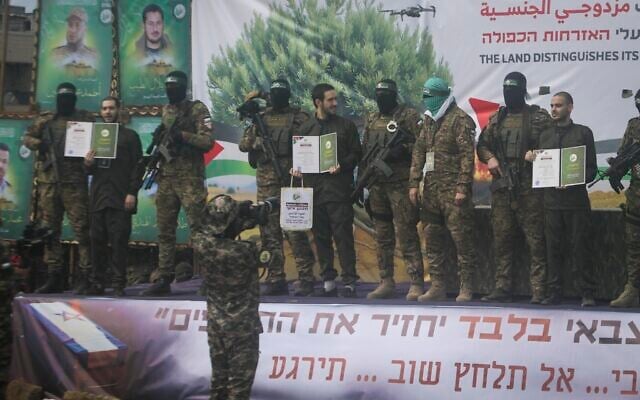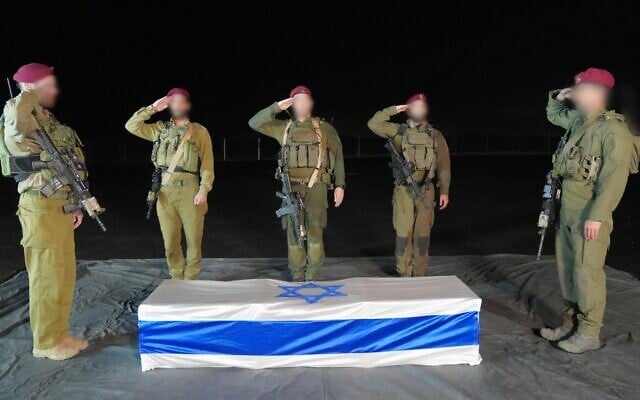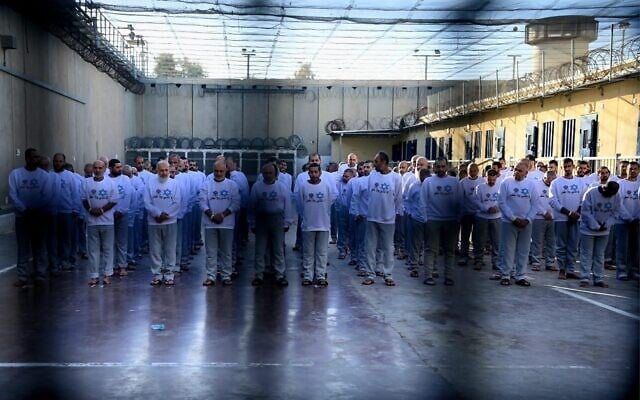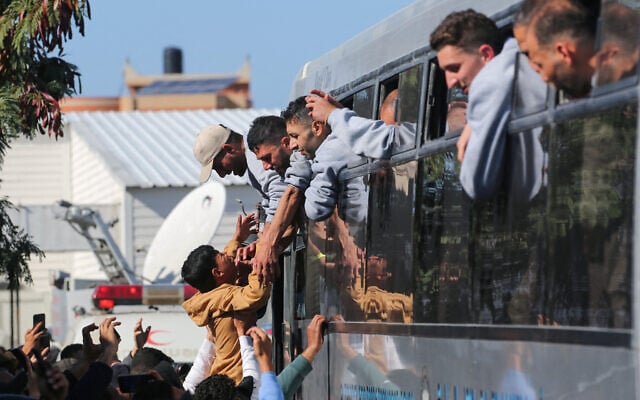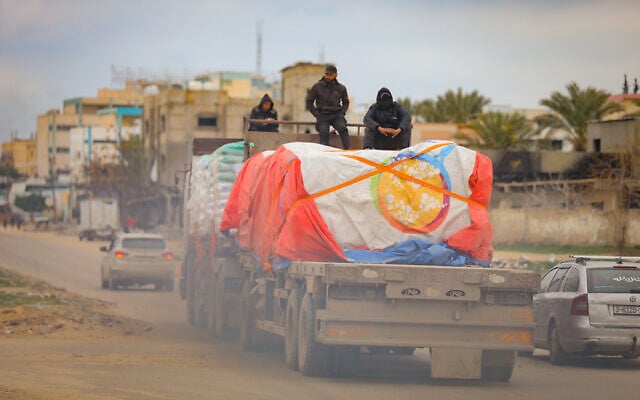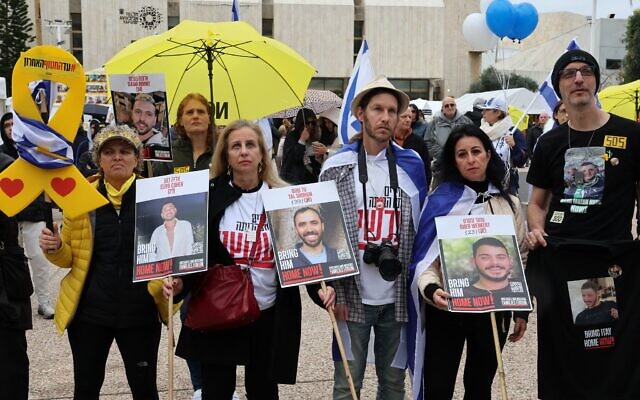


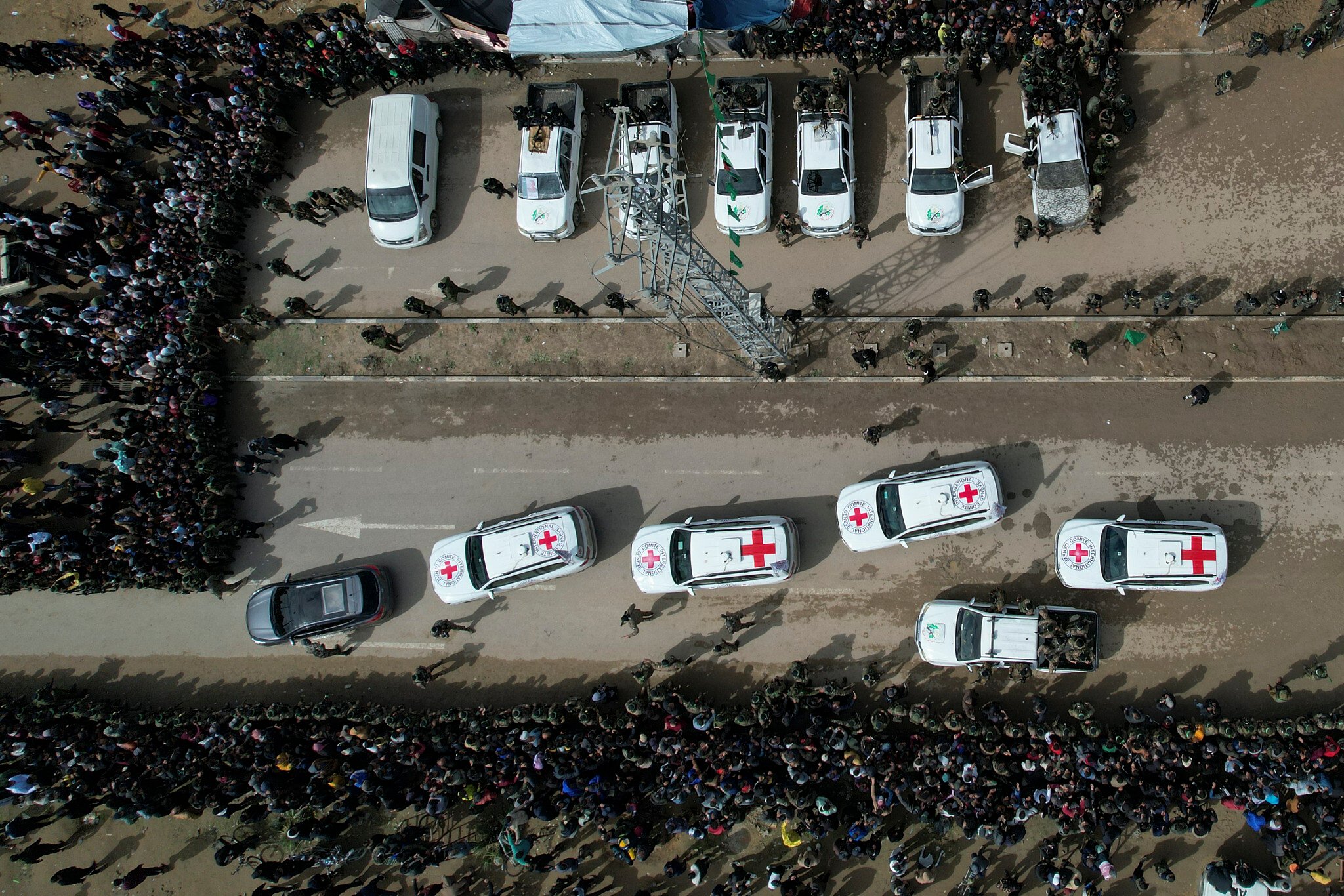
The Hamas terror group was reportedly considering a deal Monday to transfer the bodies of two slain hostages to Egypt in exchange for hundreds of prisoners previously slated for release, as international mediators sought to salvage a fraying ceasefire deal in Gaza.
Israel says it is holding onto 602 Palestinian inmates who had been scheduled to be freed Saturday until Hamas halts the practice of holding elaborate, propaganda-filled ceremonies when releasing hostages or transferring the bodies of those slain in captivity.
The decision, announced early Sunday, has set off a flurry of diplomatic activity aimed at keeping the ceasefire alive, with the crisis compounding worries that negotiators will fail to secure an agreement on extending the ceasefire beyond an early March deadline and into a second phase of hostage releases.
A senior Israeli official was quoted by the Walla news site warning that the entire hostage-ceasefire deal is on “the brink of collapse,” if the current impasse is not bridged by Thursday.
Under the current deal, Hamas is scheduled to transfer the bodies of four hostages killed in captivity Thursday, marking the final hostage-prisoner exchange of the first stage of the agreement, which began on January 19.
However, a Channel 12 news report Monday indicated that mediators are working on a formula that could see Hamas transfer two of the bodies to Egypt as early as Tuesday, in exchange for 301 of the prisoners from the Saturday release.
Should the formula work, the process would then be repeated for the two other hostages and the remaining 301 prisoners, according to the unsourced report.
By going through Egypt, Israel hopes the transfers will take place quietly, amid palpable anger and disgust over staged ceremonies put on by Hamas in Gaza in which hostages are forced to feign appreciation for their captors in front of crowds of Gazans before being handed over to the Red Cross.
On Saturday, Hamas published a propaganda video showing two hostages not slated for release being forced to watch the ceremony and beg for their freedom, further fueling Israeli ire.
Hamas held a similar ceremony last week for the handover of coffins containing the remains of octogenarian hostage Oded Lifshitz, young brothers Ariel and Kfir Bibas, respectively 4 years old and 9 months old when kidnapped on October 7, 2023, and their mother Shiri Bibas. The coffins were put on display in front of gawking crowds and gun-toting terror group operatives.
Israel had been slated to release the 602 prisoners on Saturday, including dozens serving multiple life sentences for deadly attacks on Israelis, in exchange for six living hostages, including two who had been held in Gaza for around a decade.
Prime Minister Benjamin Netanyahu decided late Saturday night to postpone the release of the inmates, accusing Hamas of repeatedly violating the ceasefire and saying the prisoners would only be released once Israel receives a promise that ceremonies “demeaning our hostages’ dignity” come to an end.
According to the senior Israeli official quoted by Walla, Hamas has since agreed to transfer the bodies of the four hostages on Thursday without any fanfare.
But despite appearing to meet Netanyahu’s demands, the premier responded by stiffening the ultimatum, informing mediators that a commitment from the terror group is insufficient and that the prisoners will only be let out once Israel receives the hostages and verifies their identity, the source said.
Israel has insisted on verifying that the released remains are indeed whom they expect to receive, after Hamas last week sent a Gazan woman’s body in place of Shiri Bibas’s remains.
It eventually gave Israel the murdered hostage’s remains.
The Prime Minister’s Office dismissed the Walla report as “more fake news from the echoes of Hamas propaganda.”
“Through his aggressive stance, the prime minister has already returned 192 hostages and he is determined to return them all,” the PMO added.
Saudi-owned newspaper Asharq al-Awsat reported earlier Monday that negotiations between Israel and Hamas were progressing and could lead to the handover of two hostages’ bodies within hours.
Hamas denied the Saudi news reports however, doubling down on its official boycott of talks with Israel through mediators.
In a statement on Telegram, Hamas official Mahmoud Mardawi demanded that Israel implement the ceasefire agreement by “releasing the 600 Palestinian prisoners” who were supposed to be freed on Saturday, and said the terror group had not changed its stance regarding continued negotiations.
The three-stage ceasefire agreement, reached last month, halted some 15 months of fighting triggered by Hamas’s October 7, 2023, onslaught, when Hamas-led invading terrorists killed some 1,200 people and took 251 hostages.
The deal requires Hamas to gradually release all its hostages, Israel to release thousands of Palestinian security prisoners in return, and both sides to halt fighting in the Strip, as the sides negotiate for a “sustainable calm” and the IDF withdraws gradually from the enclave. With the first phase of the deal set to end this coming Saturday, negotiations are ongoing for the second phase.
Israeli officials have repeatedly stated in recent days that there are battle plans ready should the war resume.
But Gal Hirsch, the government’s liaison with relatives of hostages, indicated in a meeting with the families Monday that Israel was still attempting to negotiate an agreement to extend the deal to phase two.
“We’re trying to continue the phased releases to bring back living hostages, and the dead,” he was quoted saying by Channel 12.
Hirsch also reportedly told the families that Strategic Affairs Minister Ron Dermer, a close Netanyahu loyalist, was heading up negotiations, alongside himself. Previous rounds were negotiated by a team headed by Mossad chief David Barnea and Shin Bet counterpart Ronen Bar.
According to the Kan public broadcaster on Monday, Israel is currently seeking to extend the current, first phase of the deal — repeating the framework of 42 days, with a hostage release each week — without committing to end the war. According to an Israeli official, negotiations for phase two would continue during this extended phase one.
However, Egypt, which has served as a key mediator, has refused to discuss an extension of phase one until negotiations over phase two begin, according to two Egyptian officials who were not authorized to brief reporters and spoke on condition of anonymity.
One official familiar with the negotiations said the mere launch of phase two talks would keep the truce intact, according to the language of the deal. That would mean a continued halt in fighting and aid flowing into Gaza, though there would be no further hostage releases beyond what has already been negotiated, he said, speaking on condition of anonymity to discuss closed diplomatic contacts.
Hamas has previously said it is open to a short extension to complete talks on phase two, but that was before Israel held up the release of the prisoners.
One of the Egyptian officials said Egypt is also demanding Israel complete its withdrawal from the Philadelphi corridor, on the Gaza side of the border with Egypt, before moving on to the next phase. The agreement calls for that withdrawal to begin this weekend and be completed within eight days.
US President Donald Trump’s Mideast envoy Steve Witkoff said Sunday he was traveling to the region this week and hoped to “get an extension of phase one” of the deal. The US expects “there will be a phase two” of the deal, he said, adding that Netanyahu is motivated to make a deal, but called any Hamas role in governing Gaza post-war a “red line.”
Trump Monday reposted a message sent to him by released US-Israeli hostage Keith Siegel on his Truth Social page.
In the video, Siegel could be seen standing outside the ruins of a home in Kibbutz Kfar Aza. He introduced himself as the “first American hostage freed in the deal that you set in place,” once again thanking Trump for his efforts.
Siegel said it is hard for him to comprehend the destruction that Hamas wrought on October 7. “Homes that were destroyed by Hamas, that were burned. People of the kibbutz that were murdered, burned alive.”
He urged Trump to act to get the rest of the hostages out of Gaza, saying the situation is urgent.


